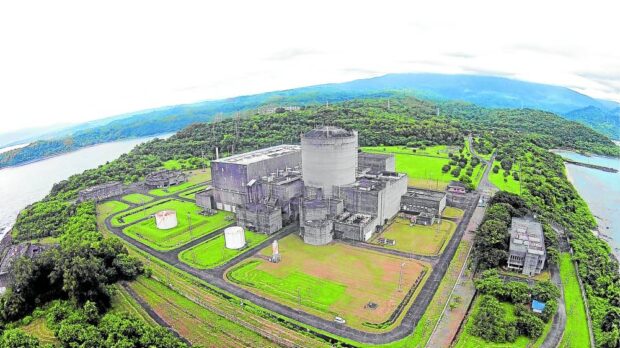Use of experimental nuke technology in PH opposed

MOTHBALLED | The Bataan Nuclear Power Plant was abandoned before it could even operate due to safety concerns. (INQUIRER FILE PHOTO)
MANILA, Philippines — House Deputy Minority Leader France Castro, a member of the Makabayan bloc, is pushing for an investigation of the recently signed “123 agreement” between the Philippines and the United States with a warning that experimental nuclear technology posed a threat to Filipinos’ health and safety.
Castro, who is an ACT Teachers representative, urged the House of Representatives to deliberate on House Resolution No. 582 filed by the three-member Makabayan bloc in 2022 to push for a probe of the deal.
In a statement sent to the Inquirer, Castro cited concerns raised by US experts on the design, safety, and costs of modular or nuclear microreactors.
Castro opposed the deal that was signed on the sidelines of the recently concluded 30th Asia-Pacific Economic Cooperation Leaders Meeting held in San Francisco, California, because of the “high threats posed to the health and safety of Filipinos and our environment by experimental nuclear technology.”
‘Guinea pigs’
“As it is, modular or nuclear microreactors are still at an experimental stage. Because of the 123 agreement, Filipinos might end up as guinea pigs for this technology the United States is still testing,” she said.
Castro cited concerns raised over the US Army’s plan to construct a mobile nuclear reactor that can be flown by a cargo plane and generate enough power for a military base.
She added that NuScale Power LLC, a nuclear company attempting to produce commercial versions of small modular nuclear reactors, also faced criticism from nuclear energy experts on “cost and safety drawbacks” such as escalation costs, design and safety issues.
Filed by the Makabayan bloc in November 2022, HR 582 has not yet been tackled by the House special panel on nuclear energy led by Rep. Mark Cojuangco.
Last week, the House approved on second reading House Bill No. 9293, or the Philippine National Nuclear Energy Safety Act.
Castro argued that the “123 agreement” was the “fastest negotiated” civil nuclear cooperation deal.
Castro’s concerns were not shared by other members of the House, who were more optimistic about the prospects of the “123 agreement.”
Ang Probinsyano Rep. Alfred delos Santos said the agreement “should allay any fears and disinformation about safety and security” because it enforces the Treaty on Non-Proliferation of Nuclear Weapons.
“Adding nuclear energy to our country’s energy mix does not mean neglecting solar and wind. Solar and wind are also part of our mix,” he said.